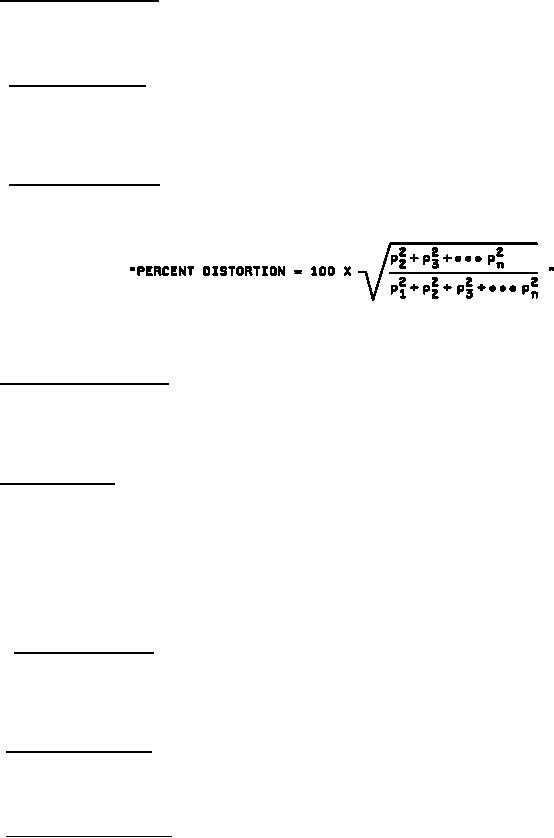
MIL-DTL-12606E
4.7.7 Harmonic distortion (see 3.4.6). The loudspeaker shall be mounted in its appropriate test cabinet. A constant voltage having a
rms value of 4.00 ± .1 volts at discrete frequencies of 750, 2,000 and 4,000 Hz ± 10 percent shall be applied to the voice coil terminals of
loudspeaker types LS-445/U and M12606-02. A constant voltage having a rms value of 4.00 ± .1 volts at discrete frequencies of 1,000,
2,000, 4,000 Hz ± 10 percent shall be applied to the voice coil terminals of loudspeaker type M12606-01. Harmonic distortion shall be
determined by one of the methods specified in 4.7.7.1 or 4.7.7.2.
4.7.7.1 Distortion analyzer method. The total harmonic distortion shall be determined by a distortion analyzer, having the following
minimum characteristics:
a. Frequency range fundamental frequency from 20 to 20,000 Hz.
b. Frequency calibration - ±2 percent from 20 to 20,000 Hz.
c. Harmonic measurement - ±3 percent of full scale value for distortion level as low as .5 percent.
4.7.7.2 Sound wave analyzer method. The harmonic distortion in the acoustic output of the loudspeaker at each frequency shall be
determined by using a sound wave analyzer. The total harmonic distortion at each frequency shall be determined by the following
formula:
Where P1 is the pressure amplitude of the fundamental and P2, P3, etc., are the pressure amplitudes of the harmonic components in
the output.
4.7.8 Immersion resistance (see 3.4.7). The loudspeaker shall be submerged in fresh tap water to a depth of at least 3 feet and
maintained at that depth for a period of 24 hours ±1 hour. The water temperature shall be 65-75°F. At the end of the 24-hour
submersion period, the loudspeaker shall be removed from the tank, and shall be drained, wiped, and allowed to dry naturally for 30
minutes ±5 minutes. At the completion of the 30 minutes ±5 minutes drying period, the loudspeaker shall be tested in accordance with
4.7.5. The loudspeaker shall be allowed to dry at room ambient conditions for 48 hours ±1 hour, and shall then be tested in accordance
with 4.7.6 and 4.7.7, respectively, and examined for evidence of damage.
4.7.9 Endurance (see 3.4.8). A constant rms voltage of 2.85 ±.1 volts, at each of four discrete frequencies, shall be applied to the
voice coil terminals continuously for 25 hours ±1 hour at each selected frequency (100 hours ±4 hours total). One frequency shall be
selected from each of the following frequency ranges, and shall be of a value, which will not coincide with any major resonant frequency
of the loudspeaker:
250
-
400 Hz
400
-
500 Hz
1000
-
1500 Hz
2000
-
3000 Hz
After the test, the frequency response shall be determined in accordance with 4.7.6, and the loudspeaker examined for damage.
4.7.10 Cold resistance (see 3.4.9). The loudspeaker shall be placed in a cold chamber and maintained at a temperature of 80 +0/-
5°F for 24 hours ±1 hour. The temperature shall then be raised to and stabilized at 65 +0/-5°F. A constant rms voltage of 4.00 ± .1
volts at a frequency of 300 +25/-0 Hz shall be applied to voice coil terminals for 5 minutes ±1 minutes at that temperature and the
acoustic output checked for buzzing, rattling, or other spurious sounds. The temperature of the loudspeaker shall then be raised to room
ambient conditions and the frequency response and harmonic distortion determined in accordance with 4.7.6 and 4.7.7, respectively, and
the loudspeaker examined for damage.
4.7.11 Heat resistance (see 3.4.10). The loudspeaker shall be placed in a heat chamber and maintained at a temperature of +160
+5/-0°F for a period of 24 hours ±1 hour. A constant rms voltage 4.00 ± .1 volts at a frequency of 300 +25/-0 Hz shall be applied to the
voice coil terminals for 5 minutes ±1 minutes, while at that temperature and the acoustic output checked for buzzing, rattling, or other
spurious sounds. The temperature of the loudspeaker shall then be reduced to room ambient conditions and the frequency response and
harmonic distortion determined in accordance with 4.7.6 and 4.7.7, respectively, and the loudspeaker examined for damage.
4.7.12 Moisture resistance (see 3.4.11). The loudspeaker shall be tested in accordance with method 106 of MIL-STD-202. The
following details shall apply:
a. Mounting Any convenient mounting with the front face of the loudspeaker cone exposed and parallel with the vertical plane.
b. Polarizing voltage - -Not applicable.
17
For Parts Inquires call Parts Hangar, Inc (727) 493-0744
© Copyright 2015 Integrated Publishing, Inc.
A Service Disabled Veteran Owned Small Business